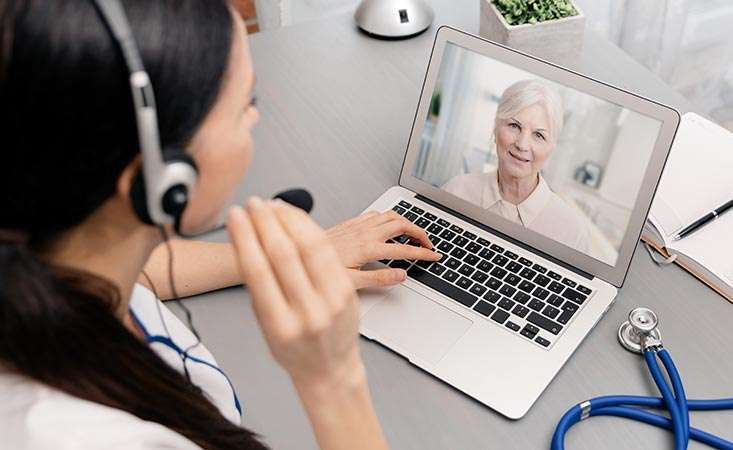
Because of the coronavirus disease (COVID-19) pandemic, many Americans and people around the world have been instructed to practice social distancing and other ways to reduce face-to-face interactions and potential exposure to the virus.
But a challenge remains that patients who have been diagnosed with pancreatic cancer, or those who might be experiencing symptoms of the disease, are worried about visiting their doctors and healthcare teams.
People are concerned they’ll risk exposure by going to the doctor’s office or hospital, and others are afraid that doctors, nurses and medical equipment should be reserved for those affected by the coronavirus.
A solution can be telemedicine, which is defined as a conversation with a member of your healthcare team – such as a primary care physician, oncologist, dietitian, nurse practitioner, psychologist, etc. – via technology, like a telephone or video phone call.
Keep in mind that if you are very sick or need assistance, make sure you communicate that to your care team right away. If you are having a medical emergency, call 911.
Telemedicine is a new way of communicating with healthcare professionals, so it can feel uncomfortable and overwhelming. We’re sharing some tips with you today to make it more comfortable:
1. Ask your healthcare team if they have telemedicine options.
Whether you have an upcoming checkup scheduled or have some questions related to new symptoms or treatment side effects, call or email your care team to see if there are telemedicine options available to you.
2. Learn whether your medical team communicates by phone or video calls.
Some doctor’s offices and hospitals may utilize telephone calls to connect with patients, while others may opt for video calls, which can include Skype, Zoom, WebEx or other programs. Find out in advance which program your healthcare team uses so you can be sure to have the correct applications on your phone, computer or other device. Also, ask if it is possible to test the connection with someone from their team prior to your actual appointment.
3. Find a quiet spot for the call, and make sure you have a strong enough internet signal and you’re powered up.
Many of us are at home with spouses, children, parents or others. Make sure you are somewhere quiet and without distraction so you can concentrate on your call. Also be sure your phone, tablet or other device is fully charged or plugged in during the call. If you have spotty internet, see if your phone has a “hotspot” that is stronger. Keep in mind these calls can use a lot of data if you don’t have an unlimited data plan.
4. Write down questions and keep track of symptoms and side effects.
As with any doctor’s visit, it’s useful to be prepared with updates you’d like to give and questions you want to ask. If you’re currently on treatment, it’s important to track symptoms and new or worsening side effects you’re experiencing.
It can be helpful to keep a journal of how you’re feeling each day, and also to keep a running list of questions you’d like answered between visits.
5. Remember our Patient Services team is here to help.
The Pancreatic Cancer Action Network’s (PanCAN) Patient Services case managers are here to provide free, personalized information and resources to pancreatic cancer patients and their loved ones – including resources about how the coronavirus disease impacts patients and their care.
They can provide a list of specialists who treat a high volume of pancreatic cancer patients, including information about those willing to provide a second opinion remotely.
Whether you’re having in-person or telemedicine visits, you should feel comfortable and supported by your healthcare team. PanCAN strongly recommends seeking a healthcare team that suits all of your physical, mental and emotional needs.





